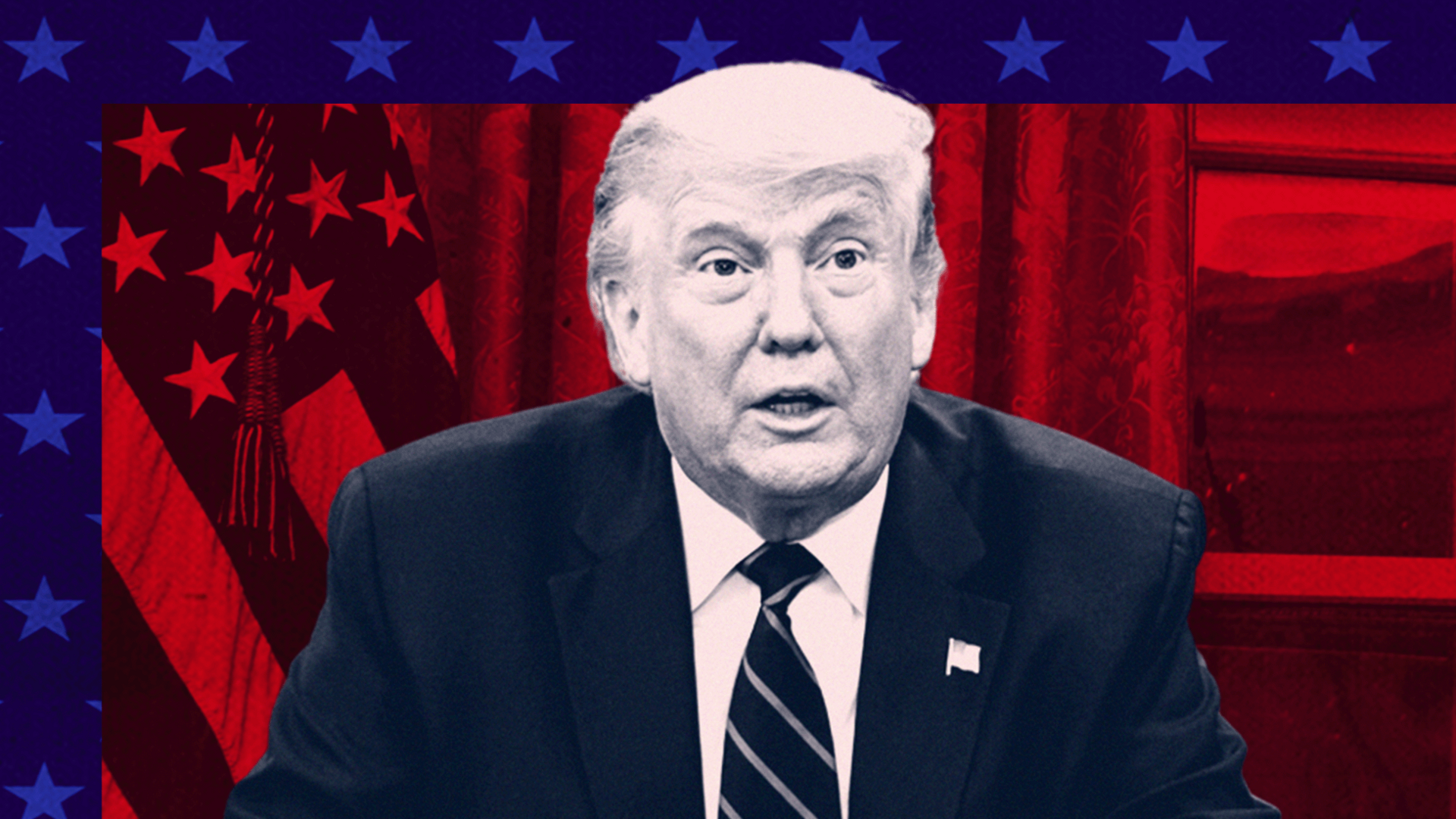Trump to announce his vice-president pick: Who is in the running?
- Published
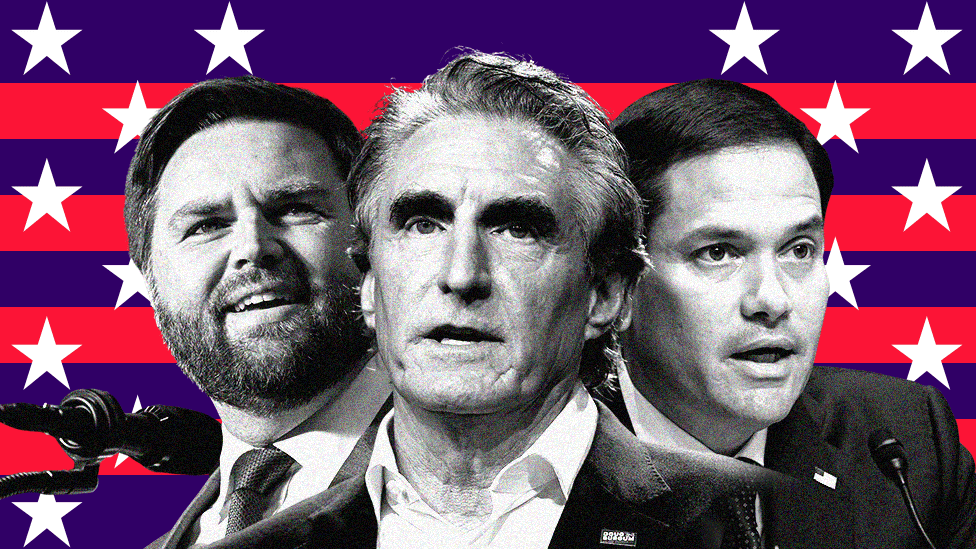
Donald Trump is expected to announce within hours who he has chosen as his Republican running mate.
His vice-presidential pick will be unveiled on the first day of the Republican party convention in Milwaukee on Monday, according to CBS News, the BBC's US partner.
There are three names getting a lot of buzz - JD Vance, Doug Burgum and Marco Rubio - and they are reportedly in the final three.
But there are plenty of others who could spring a surprise.
Here's a rundown.
JD Vance
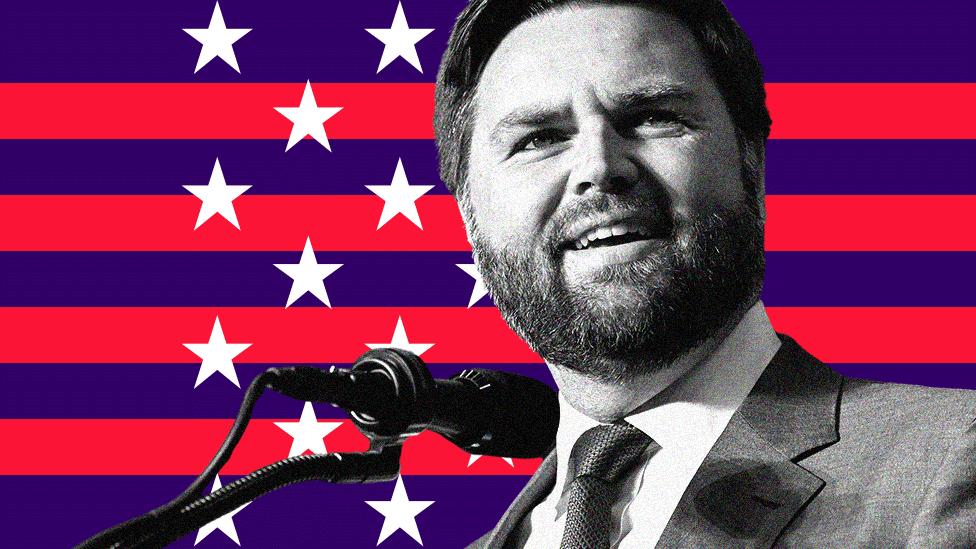
JD Vance, 39, the junior senator from Ohio, has rallied support for Trump on several occasions in recent months.
The Yale-educated former venture capitalist wrote the best-selling book Hillbilly Elegy, a memoir that followed his blue-collar upbringing in the "rust-belt" Midwest.
Once a self-identified "never-Trumper", Mr Vance refashioned himself when he ran for the Senate in 2022 with Trump's crucial endorsement.
In office, he has championed many of the issues that animate Trump's base.
Mr Vance believes he would be of better use to a future Trump administration in the Senate, but he has not ruled out being vice-president.
"I want to help him however I can," he recently said.
Trump has also dismissed a rumour floating that Mr Vance's beard would disqualify him - as the former president is reportedly averse to facial hair.
Doug Burgum
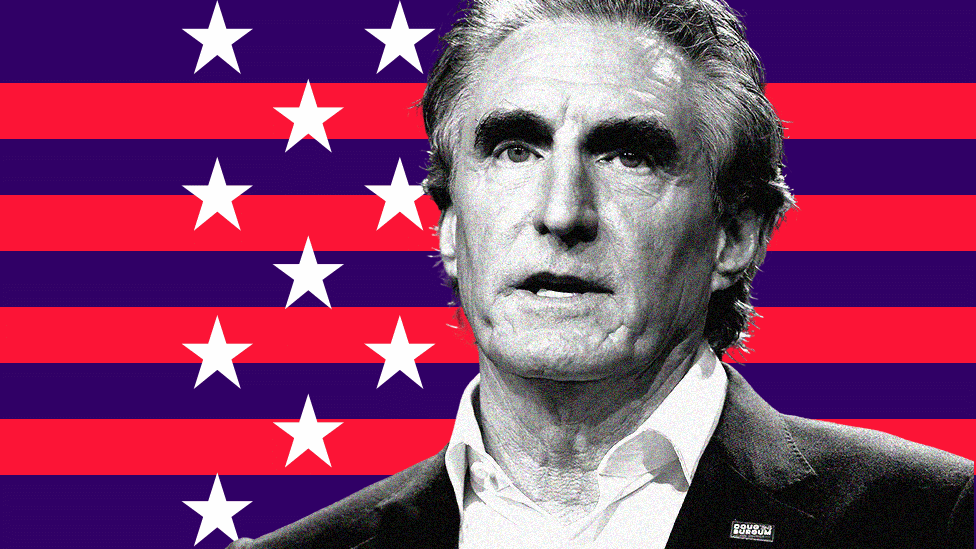
Another of Trump's fallen primary opponents, Doug Burgum, 67, is in his second term as governor of North Dakota.
Mr Burgum made little impact as a presidential candidate but has returned to the campaign trail with his endorsement of Trump.
A social conservative and fiscal hawk, he said in 2023 that he would never conduct business with Trump because "you're judged by the company you keep".
Mr Burgum began his career with a small software start-up later acquired by Microsoft and his years of entrepreneurship have earned him a billionaire fortune.
He is reported to have impressed Trump with his low-drama demeanour and political know-how - attributes that led to the selection of former VP Mike Pence in 2016.
North Dakota's near-total abortion ban, which Mr Burgum supported, is "a little bit of an issue", Trump said during an interview on Fox News radio.
"I think Doug is great, but... he's taken a very strong stance," he said.
Burgum has said he supports leaving abortion laws up to individual states, and a proposed Republican party platform has dropped a section calling for a nationwide abortion ban. The abortion issue drove Democratic voters to the polls in 2022's midterm elections.
Marco Rubio
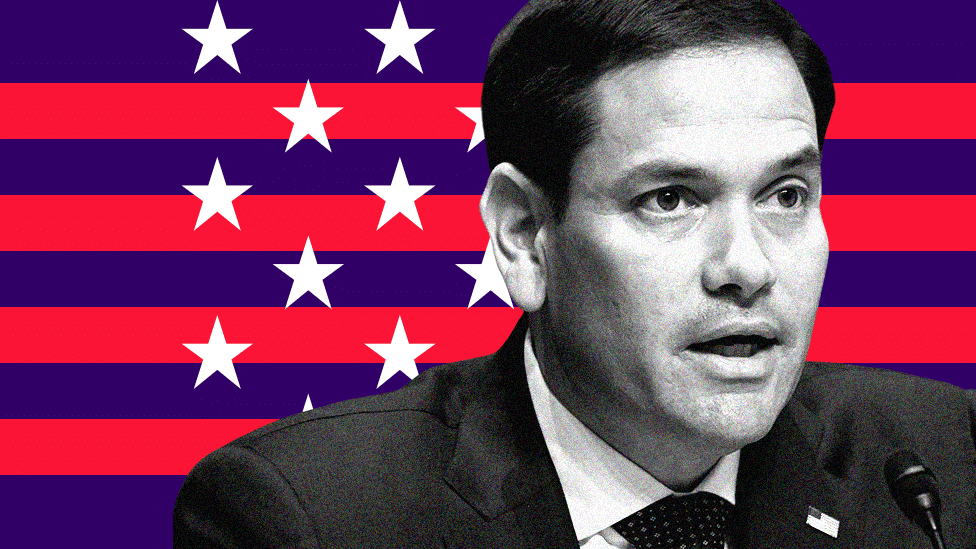
Trump and Marco Rubio did not get on in the 2016 Republican primary race. Trump called him "Little Marco" - a reference to his stature - while Mr Rubio commented about Trump's small hands.
The Florida senator has since worked closely with his former rival, endorsing him early on in this primary season.
The son of working-class Cuban immigrants, Mr Rubio was once floated as a potential running mate to 2012 Republican nominee Mitt Romney.
At only 53 he is comparatively young and telegenic, and he could help Trump gain a larger share of the Latino vote.
Mr Rubio spoke at a rally for Trump in Florida on Tuesday, and afterwards the presidential candidate said: "He's very good... Marco was great last night, very popular. And he's certainly one of the people that we're looking at."
The US Constitution could create a small procedural hurdle. It specifies that a state must cast its electoral votes for at least one candidate, president or vice-president who is not a resident of the state. Both Mr Rubio and Trump live in Florida, meaning the 30 electoral votes allocated to that state could be in doubt.
In practice, the issue could be solved by a large victory for the Republican ticket, or one of the candidates moving out of the Sunshine State. In 2000, Dick Cheney moved his official residence from Texas to Wyoming to become the running mate of another Texan, George W Bush.
Trump has said the issue doesn't rule out Mr Rubio, "but it does make it more complicated."
Tim Scott
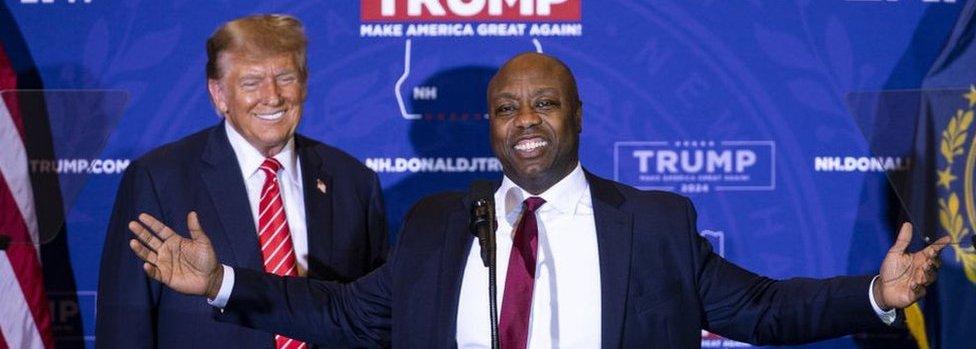
Beyond the leading trio, there is another group of possible contenders which includes Tim Scott.
The South Carolina senator is arguably the most prominent black Republican in the country. He was among the competitors Trump defeated in the party's primary contest.
Mr Scott, 58, pitched his brand of optimistic conservativism, in a play for the influential evangelical Christian vote in early voting states, but his campaign never caught fire.
After struggling to raise money, and three lacklustre debate performances, he exited and quickly endorsed Trump.
It was his rousing remarks at a Trump campaign rally before the New Hampshire primary that elevated him as a top contender for vice-president.
"We need Donald Trump," he said, before appearing on stage during his fellow Republican's victory speech.
He told Trump: "I just love you." With a smile, the former president responded: "That's why you're a great politician."
Since then, Trump has often remarked that Mr Scott is "much better [at advocating] for me than he was for himself".
Byron Donalds
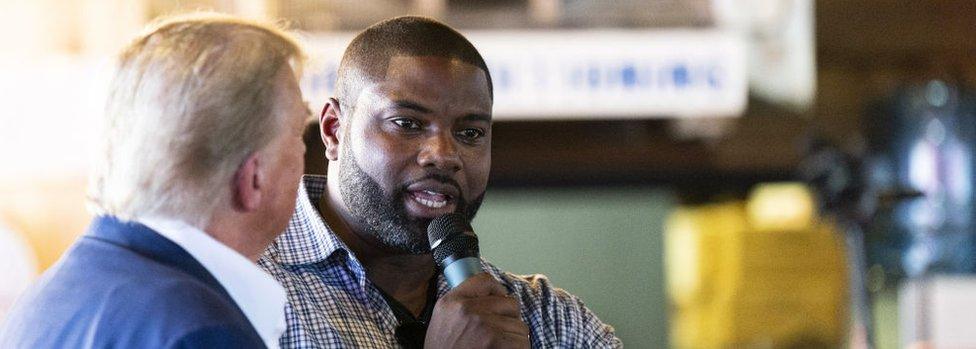
Byron Donalds, 45, has helped raise the profile of black conservatism.
Born in New York to a single mother, Mr Donalds worked in banking, insurance and finance before entering local politics in Florida in 2012.
After four years in the Florida House of Representatives, he has served since 2020 in the US House, representing the right-wing flank of his party in Washington.
On 15 June, Mr Donalds joined Trump at a Michigan campaign event aimed at winning over black voters. The former president openly touted Mr Donalds as a potential running mate.
"Byron Donalds is an incredible guy, and I noticed he happens to be on the list of potential vice-presidents," Trump said. "Would anyone like to see him as a vice-president?"
In an interview with Fox News, he played coy when asked if he had discussed the job with Trump.
"Maybe, maybe not," Mr Donalds said. "I'm going to keep that to myself."
"I think President Trump is going to make a great decision," the congressman continued. "Obviously it's his decision, his decision alone."
Talk of his joining the ticket has cooled in recent days, however, as US media has reported that Trump's shortlist has narrowed.
Elise Stefanik
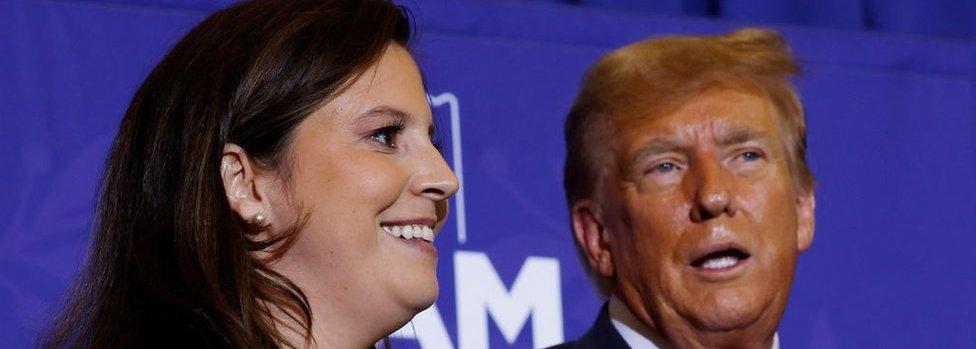
Elise Stefanik, 40, is a New York congresswoman and the highest-ranking Republican woman in the US House of Representatives.
The once-moderate Trump-hesitant Republican has drifted to the right in recent years, and is now widely considered one of Trump's most loyal defenders on Capitol Hill, even joining his defence at his first impeachment trial in 2020.
In recent months, she has also risen to modest fame in media circles, with her viral take-down of two Ivy League college presidents and elevation of the issue of antisemitism on US college campuses.
She has said that she would be "honoured" to serve in the Trump administration "in any capacity", but she too has not appeared on recent lists of the top contenders.
Tulsi Gabbard
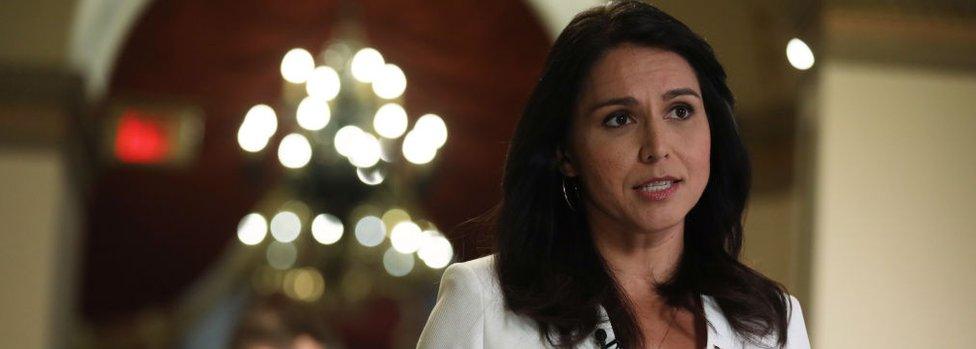
As a Democrat, she was the first Hindu member of the US Congress. Now Tulsi Gabbard may be the biggest dark horse on Trump's list.
A decade ago, the Iraq War veteran and US Army reservist served as vice-chairwoman of the Democratic National Committee - before resigning to endorse Bernie Sanders's 2016 presidential campaign.
Her time in Congress, from 2013-21, was marked by frequent criticisms of the Obama administration and US military interventionism.
She ran in the 2020 Democratic presidential primary, with her most notable moment being a fierce critique of Kamala Harris - now the vice-president - over her past as a prosecutor in California.
Ms Gabbard, 43, then beefed up her contributions to Fox News and announced in 2022 that she was leaving the Democratic Party. But she would still be a huge surprise if chosen.
Kristi Noem
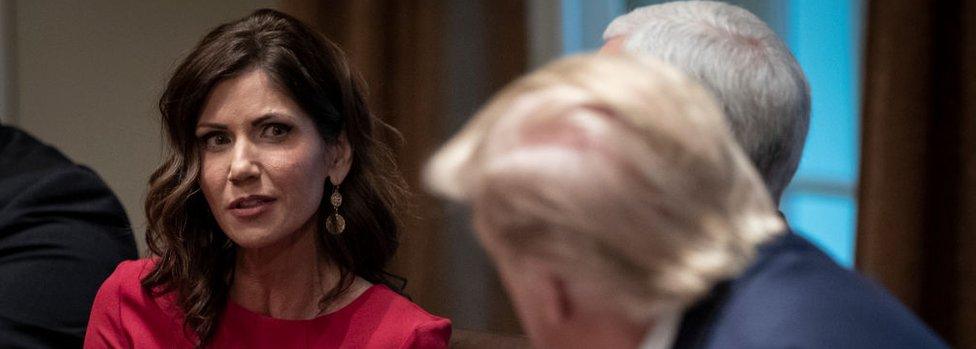
Kristi Noem, the governor of South Dakota, once topped a poll taken by mostly Trump diehards on whom he should pick as his vice-president.
Ms Noem, 52, rose to national prominence with appearances on Fox News, especially when she flouted mask mandates and other restrictions during the pandemic.
Her star was very much on the rise until the release of her memoir, in which she recounted the story of shooting her 14-month-old dog, because it wasn't a good hunting companion. Cricket was "untrainable" and "dangerous", she said.
She also shot a goat she thought was "nasty" and "mean".
The story brought almost universal condemnation, and her odds of becoming VP have lengthened considerably.
Other names in the mix
Ben Carson: Trump's former Secretary of Housing and Urban Development has not been publicly auctioning for the role. The former paediatric neurosurgeon and failed 2016 presidential candidate was absent from Trump's criminal trial in New York and so far has not been seen on the campaign trail. But his name has remained in the mix, according to NBC News.
Tom Cotton: The second-term Arkansas senator and combat veteran represents a reliably conservative state and is known as a foreign policy war hawk. Mr Cotton, who graduated from Harvard Law School, was previously floated by Trump as a potential Supreme Court nominee.
Vivek Ramaswamy: A biotech entrepreneur with no previous political experience, Vivek Ramaswamy impressed Trump fans during his 2024 presidential bid with his sure-footed rhetoric, bold policy agenda and youthful vigour. Mr Ramaswamy dropped out and pledged his full support to Trump, but the former president has recently indicated he has been scratched from the list of potential running mates.
Ron DeSantis: After romping to re-election as Florida governor in the 2022 midterm elections, Mr DeSantis was pegged as the conservative leader who could carry Trump's movement forward. But his lacklustre presidential campaign crashed and burned in January, though a cheerless endorsement of his chief rival and a recent meeting between the two has since mended fences.
Nikki Haley: Several of Trump's allies have suggested that a presidential ticket that includes his former UN ambassador could help him win over the suburban female voters uncomfortable with voting for him. Ms Haley's endurance in the Republican primary and refusal to endorse Trump when she dropped out has irked him, and she was not invited to the convention. But in moves toward unity, she has released the delegates she won so that they can vote for Trump at the convention, and says she will support him in November.
Katie Britt: The first-term senator from Alabama was widely mocked when she delivered the Republican response to President Joe Biden's State of the Union speech this year, but her temperate policy positions and moderate demeanour could make her a powerful ally in the race.
Kari Lake: The former TV anchor tethered herself to Trump's unfounded claims of 2020 election fraud and ran unsuccessfully for Arizona governor in 2022, a defeat she still does not acknowledge. Ms Lake's charisma has won her many admirers in the Trump camp but she is currently the Republican nominee in this year's US Senate race in Arizona.
Sarah Huckabee Sanders: Serving as Trump's White House press secretary for two years boosted this second-generation politician to the governorship of Arkansas. Ms Sanders has not however endeared herself to her former boss, with a belated endorsement of his re-election and a declaration that being governor is "one of the best jobs I could ever ask for... and I hope I get to do it for the next seven years".
An earlier version of this article incorrectly stated that the US Constitution prohibits a presidential candidate living in the same state as their running mate.
- Published21 January 2024
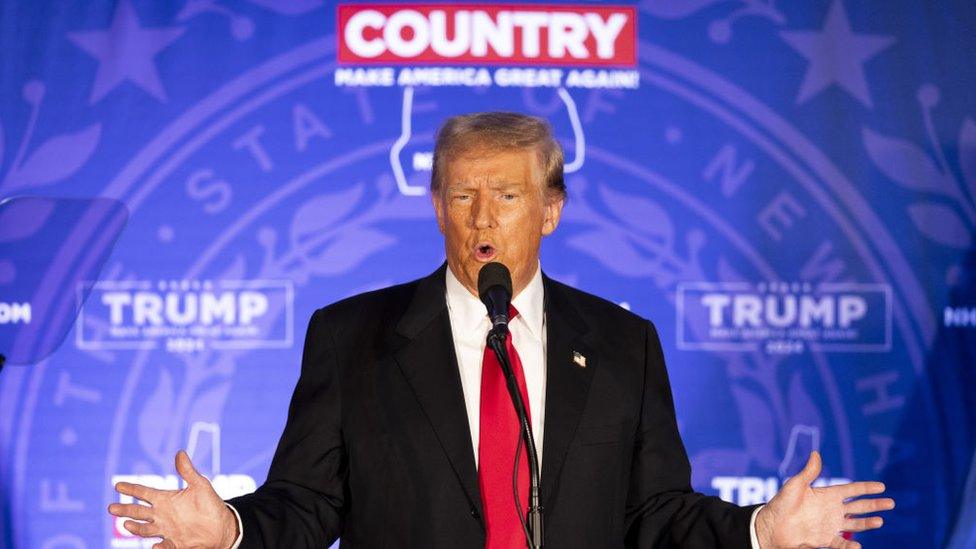
- Published12 January 2024
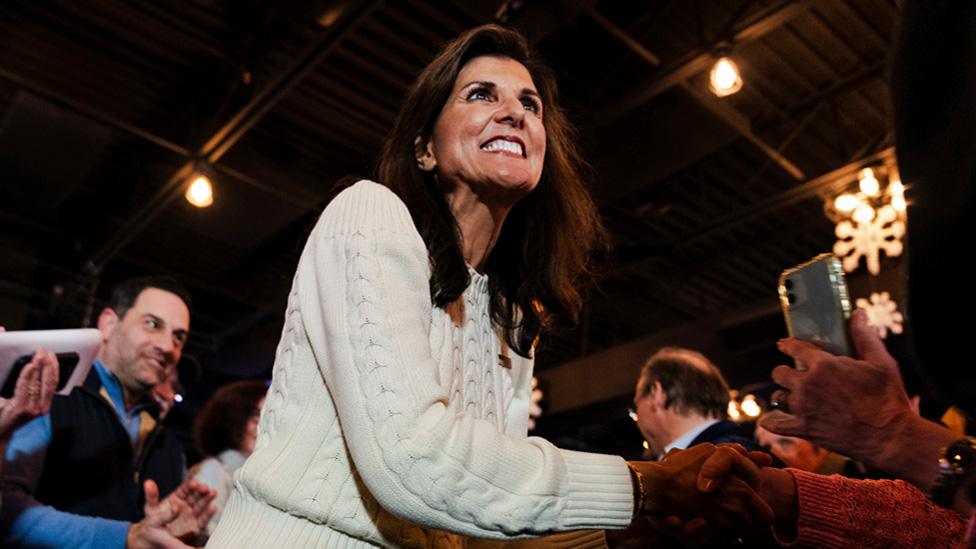
- Published3 November 2023
